Sinagoga Santa Maria la Blanca Toledo, Spain – The Oldest Synagogue in Spain
The Sinagoga Santa Maria la Blanca Toledo is the oldest synagogue still standing in Spain, dating back from the 12th century.
It’s also incredibly beautiful, built with white walls and golden details.
Not sure if it’s worth a visit?
Let’s find out!
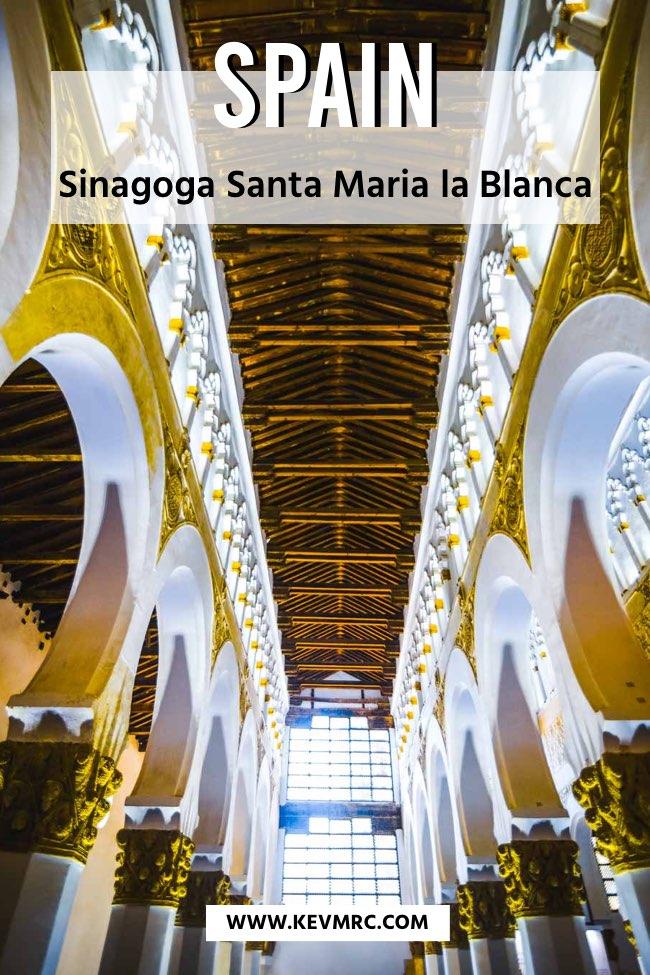
The Sinagoga Santa Maria la Blanca, literally Synagogue of Saint Mary the White, is a little gem in Toledo, and a mandatory part of any good Toledo walking tour.
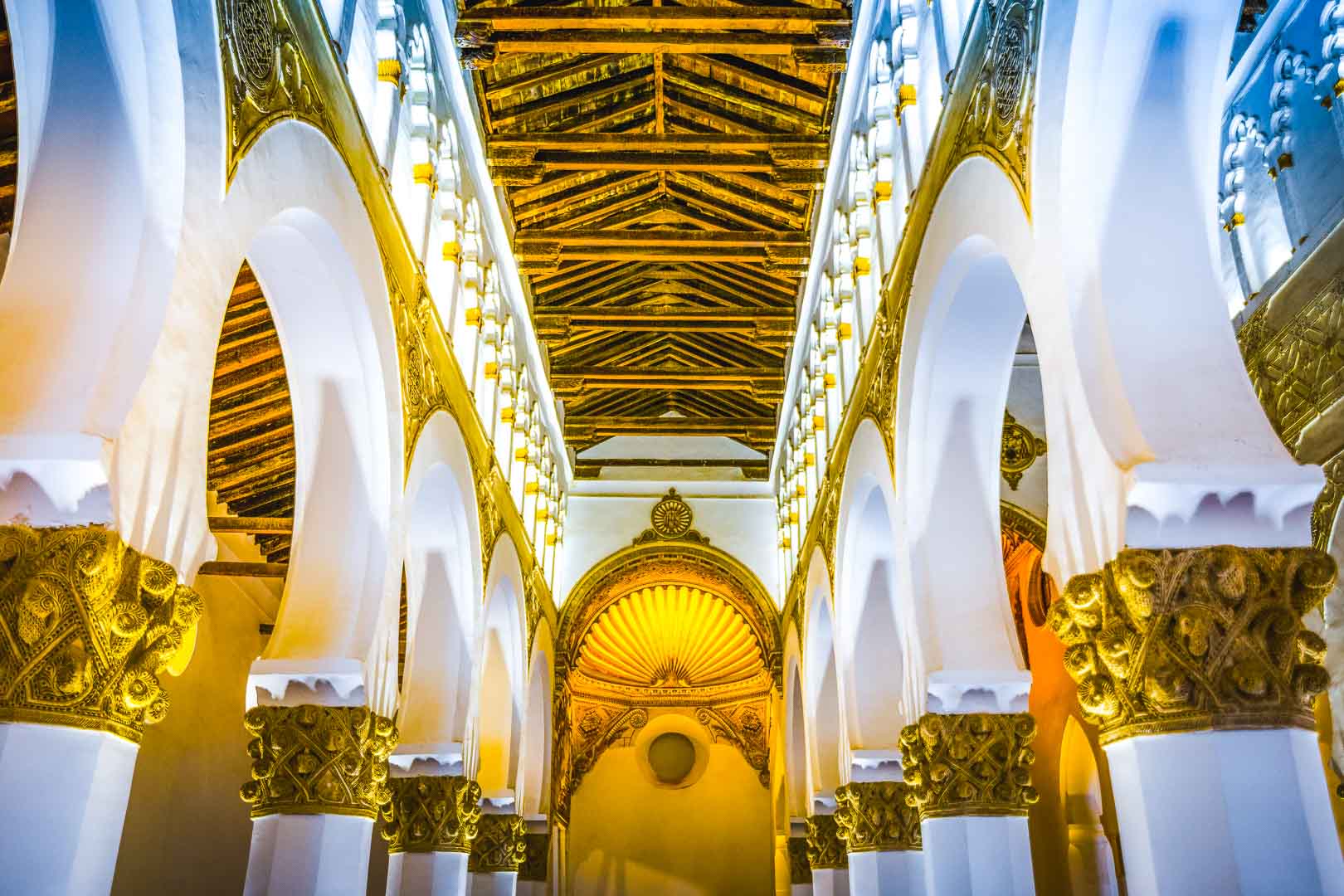
In this travel guide about the Sinagoga Santa Maria la Blanca Toledo, you’ll find in the table of contents below everything that we’ll see, from learning facts & discovering the synagogue to entry fees & more.
Simply click on the table to expand it, then click on any part you’d like to jump to.
Where is the Sinagoga Santa Maria la Blanca?
The Sinagoga Santa Maria la Blanca is located in the city of Toledo, Spain, south of Madrid.
The synagogue is in the west of the old city, a 3 minutes walk from the Monasterio de San Juan de los Reyes.
Facts about the Sinagoga Toledo
Are you fond of facts? I know I am! I love learning more about a place and its history with some quick & interesting facts, so I’ve gathered a few about the Sinagoga Toledo for you:
- the synagogue was built in 1180
- it is considered the oldest synagogue still standing in Europe
- it’s one of the best example of the cooperation between 3 cultures that existed in Toledo: it was built for the Jewish, by Islamic architects, under the agreement of the Christian Kingdom
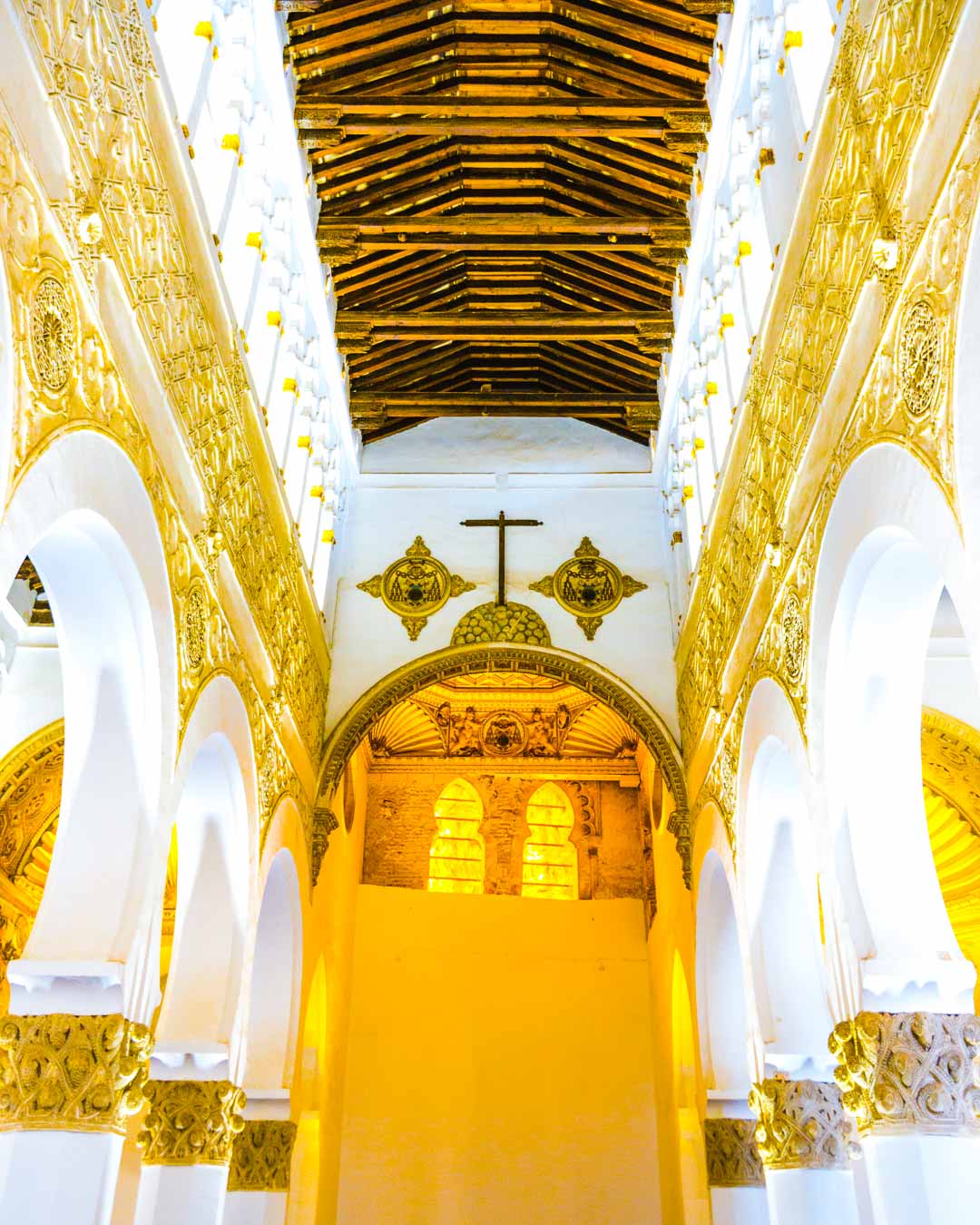
- the synagogue was used for Jewish cult for more than 200 years
- in 1405, it was turned into a church and took on the name of Santa Maria la Blanca
- it now belongs to the Christian Church, who has turned it into a museum
Discovering the Sinagoga Santa Maria la Blanca Toledo
The synagogue was one of the last monuments I visited in Toledo, after I had seen the major ones, such as the Alcazar de Toledo.
To be honest, the synagogue wasn’t even on my list of things to see in Toledo when I first visited the city. As I was walking in the street right next to the Monasterio de San Juan de los Reyes, I saw a sign pointing to the “Sinagoga Santa Maria la Blanca”. It peaked my interest, and knowing I had some time left before making my way back to Madrid to catch my plane, I decided to go inside to visit.
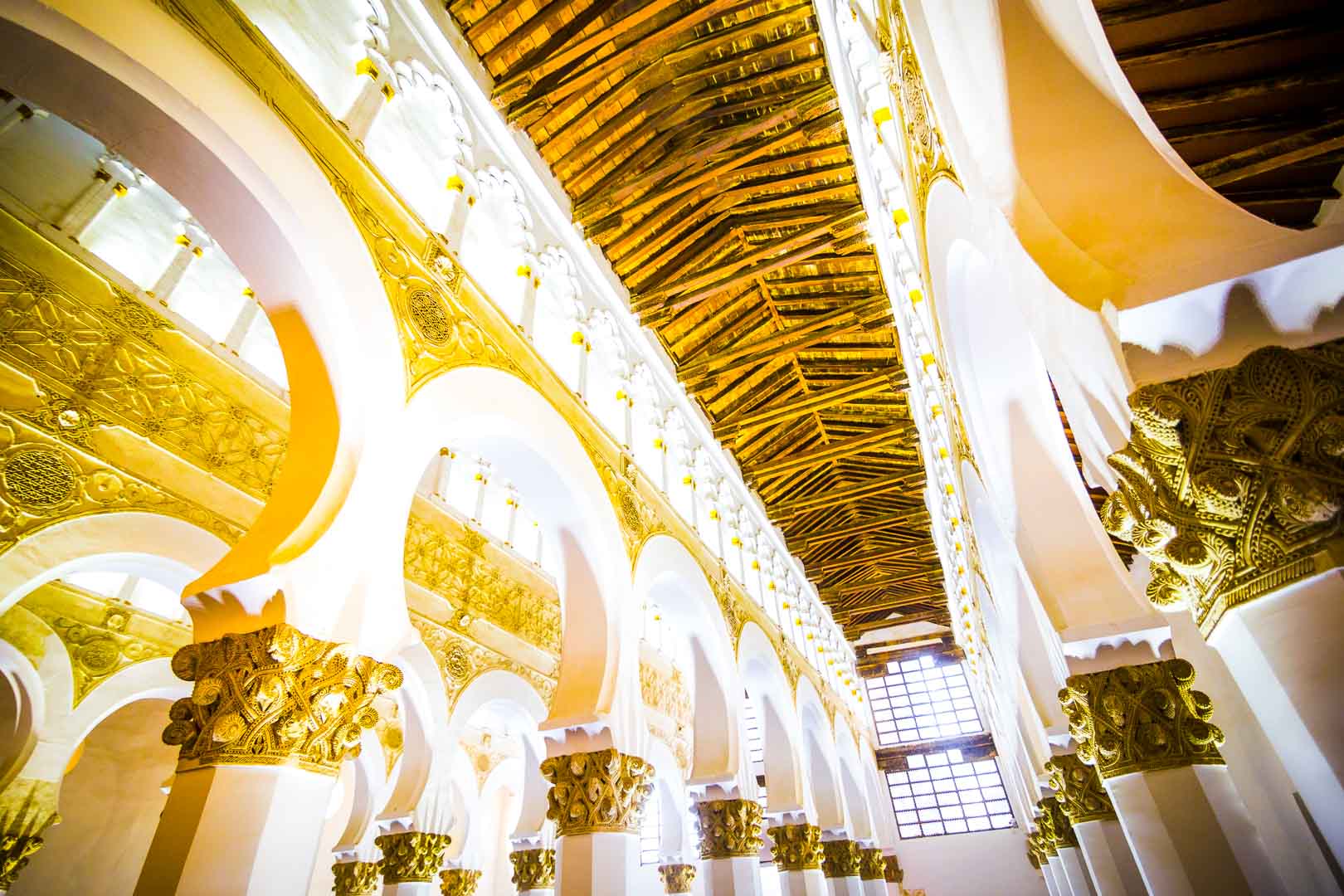
I was very surprised when I entered the synagogue: I didn’t expect to see such beauty, all white stone and gold ornaments, overall creating a very luxurious atmosphere.
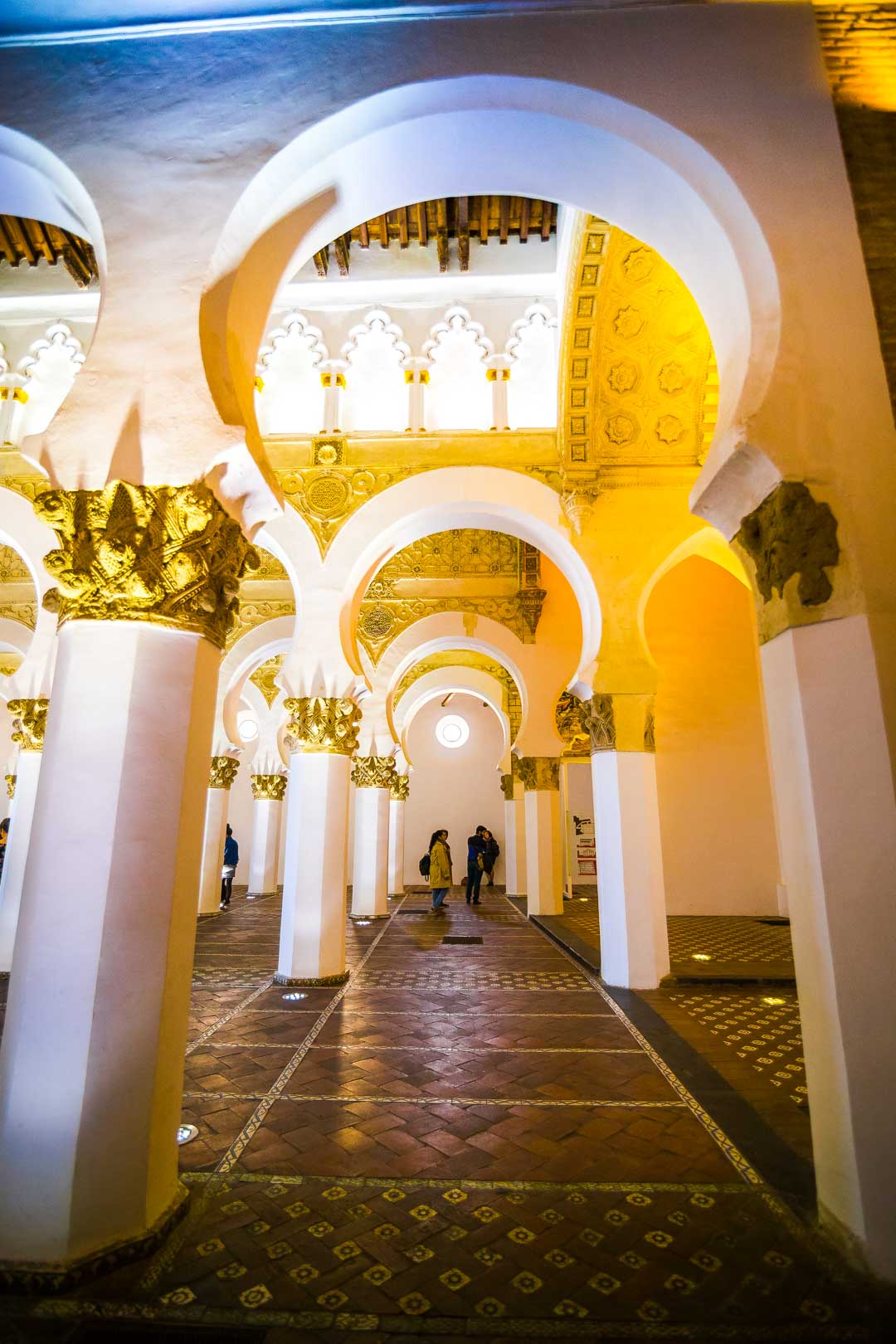
The fine details of the inside of the synagogue reminded me of the Sheikh Zayed Grand Mosque in Abu Dhabi, at a much more humble scale.
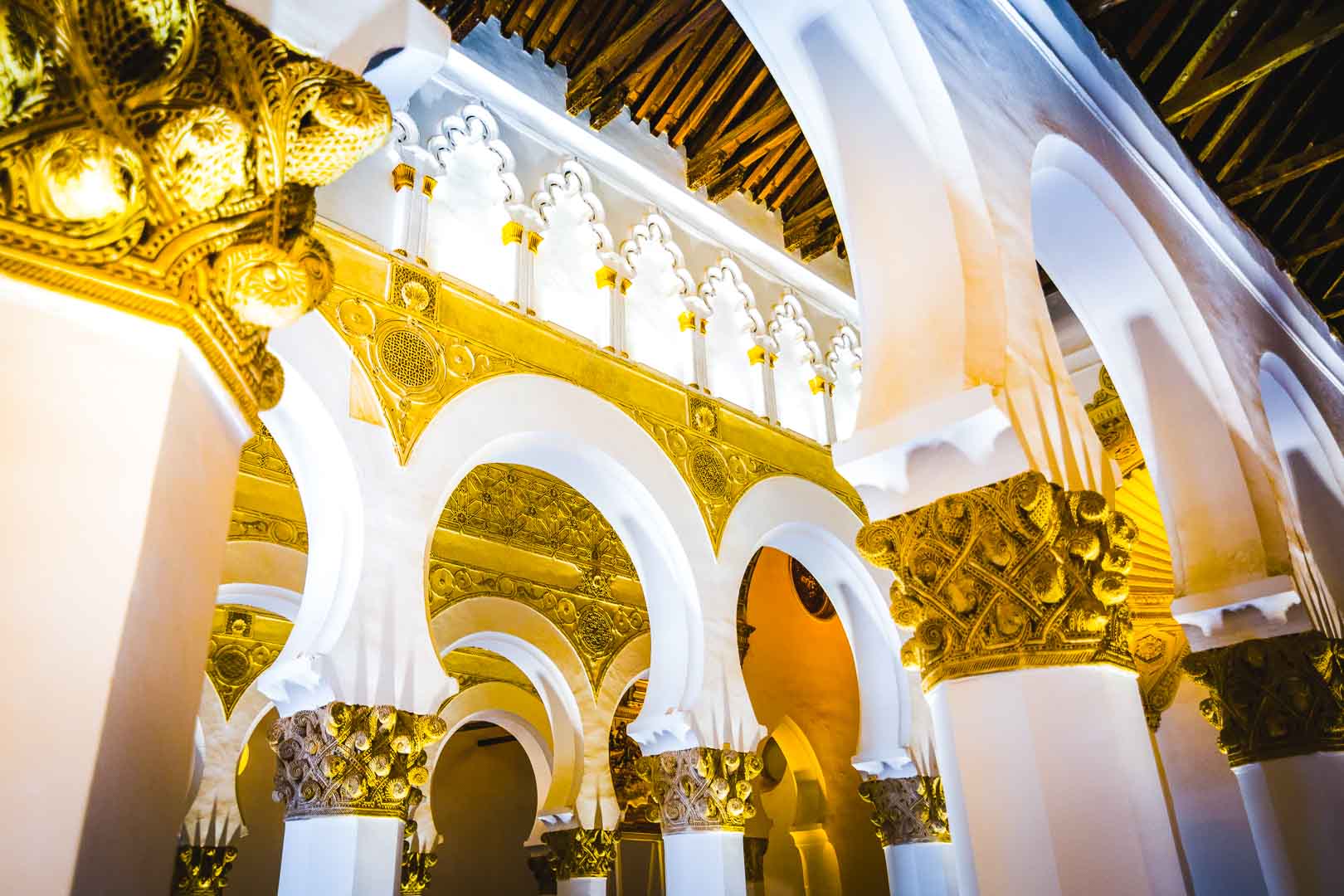
At the end of the synagogue Santa Maria la Blanca is an opening, with a stunning golden ceiling. I couldn’t help but stay there for a while, just looking up and staring at the refined details decorating the ceiling.
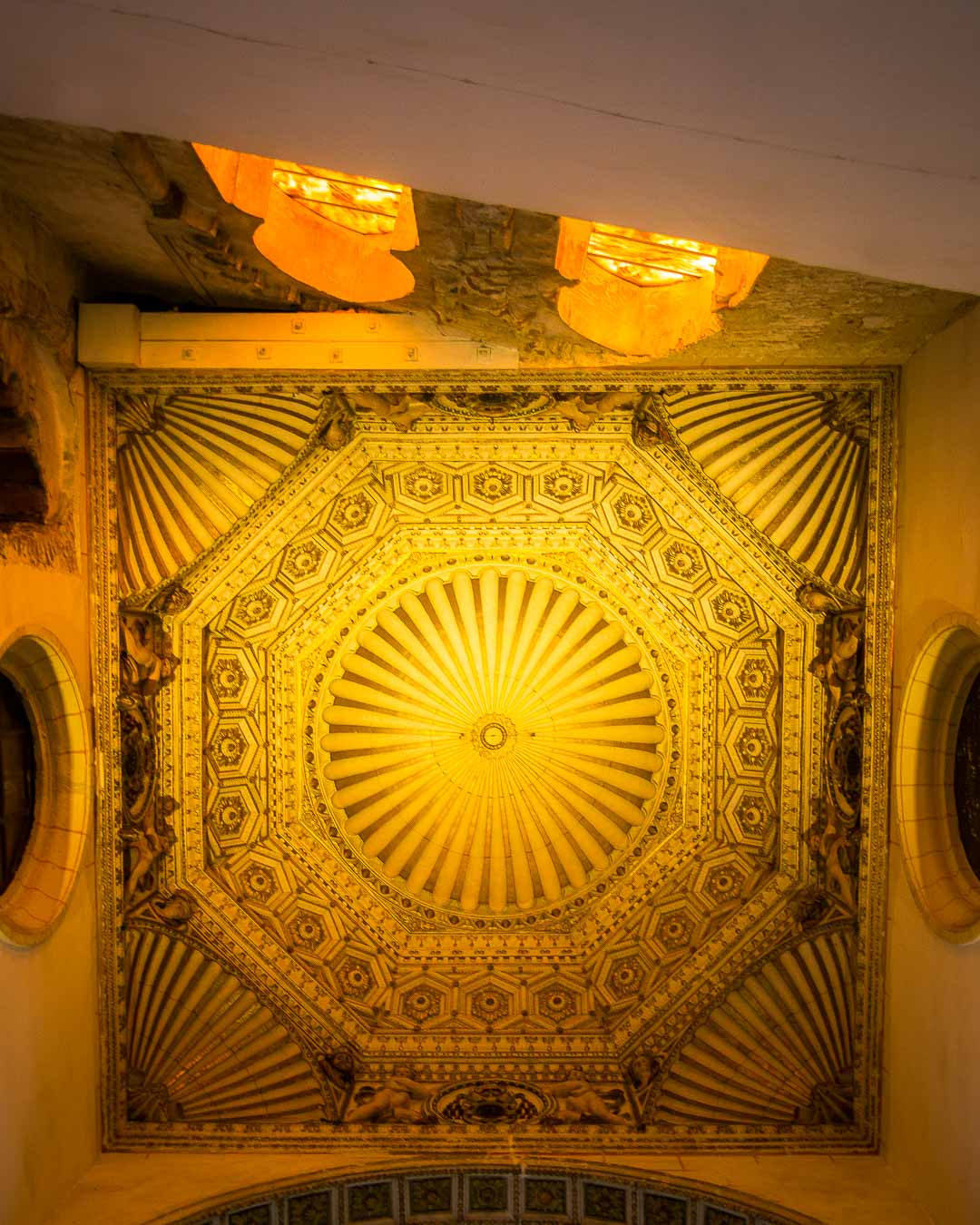
Is it worth it to visit the Synagogue of Santa Maria la Blanca?
For me personally, no it’s not. Here’s why:
- the synagogue is very small, and you’ll see all of it in under 5 minutes
- as it’s small, it gets very crowded very quickly, making it hard to enjoy the place
- you have to pay 3€ to visit, which makes it even less appealing to visit
With that being said, here are a couple of reasons why it’s still worth a visit:
- the entry is included in the Toledo Tourist Bracelet, so if you plan to visit many monuments you won’t have to pay extra for the synagogue (check below)
- the place is absolutely incredible (as you’ve seen on the pictures), and very different from the rest of Toledo
–
I hope the info will help you decide whether you should include the Sinagoga Santa Maria la Blanca in your list of places to visit while in Toledo!
Toledo Synagogue Tickets
You have to buy a ticket to visit the Toledo Synagogue.
Kids under 10 years old: free
Card only for more than 5€ – Carry cash with you
The synagogue is included in the Toledo Tourist Bracelet, a tourist card that includes entries to 7 monuments for 10€.
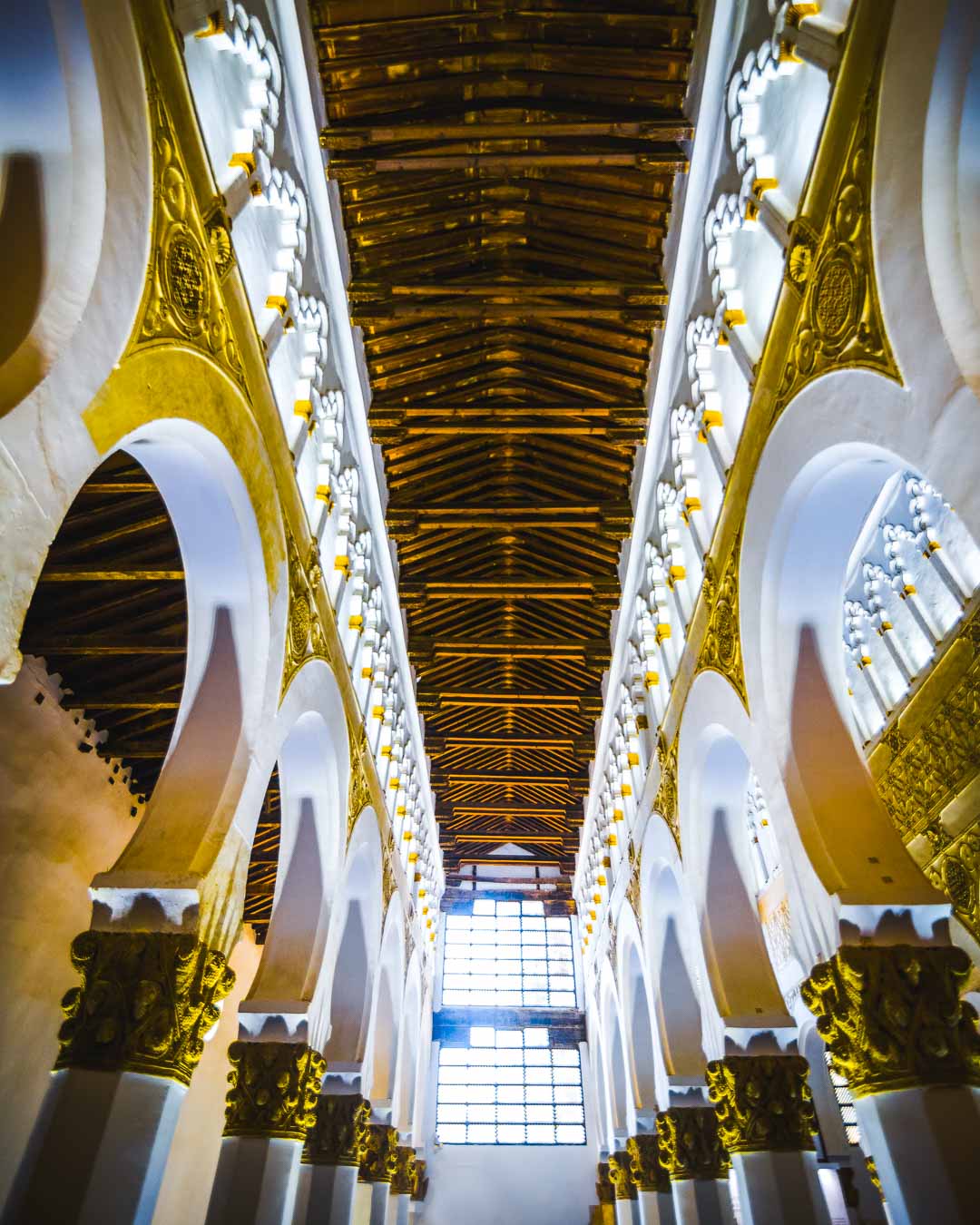
Sinagoga de Toledo Opening Hours
The opening hours for the Sinagoga de Toledo vary depending on the time of year, so make sure to check below.
Please note that last entry/last tickets sales are 20 minutes before closing time.
From October 16th to February 28th: from 10am to 5:45pm
Closed at noon on: December 24th and 31st
Closed on: January 1st and December 25th
How to Get to Toledo
You can either get to Toledo by car, or by train.
By car
Toledo is a perfect day trip from Madrid, and from other Spanish cities. You’ll find below the driving time from nearby cities:
From Madrid: 1h
From Segovia: 1h35
From Valencia: 3h30
It’s difficult to drive and park in the city; the best option is to find a parking outside of the city walls, then walk to the center.
When you’ll reach Toledo, head to the north east of the city, right outside of the city walls. This is where you’ll find the cheapest parking options, and the most parking spaces available.
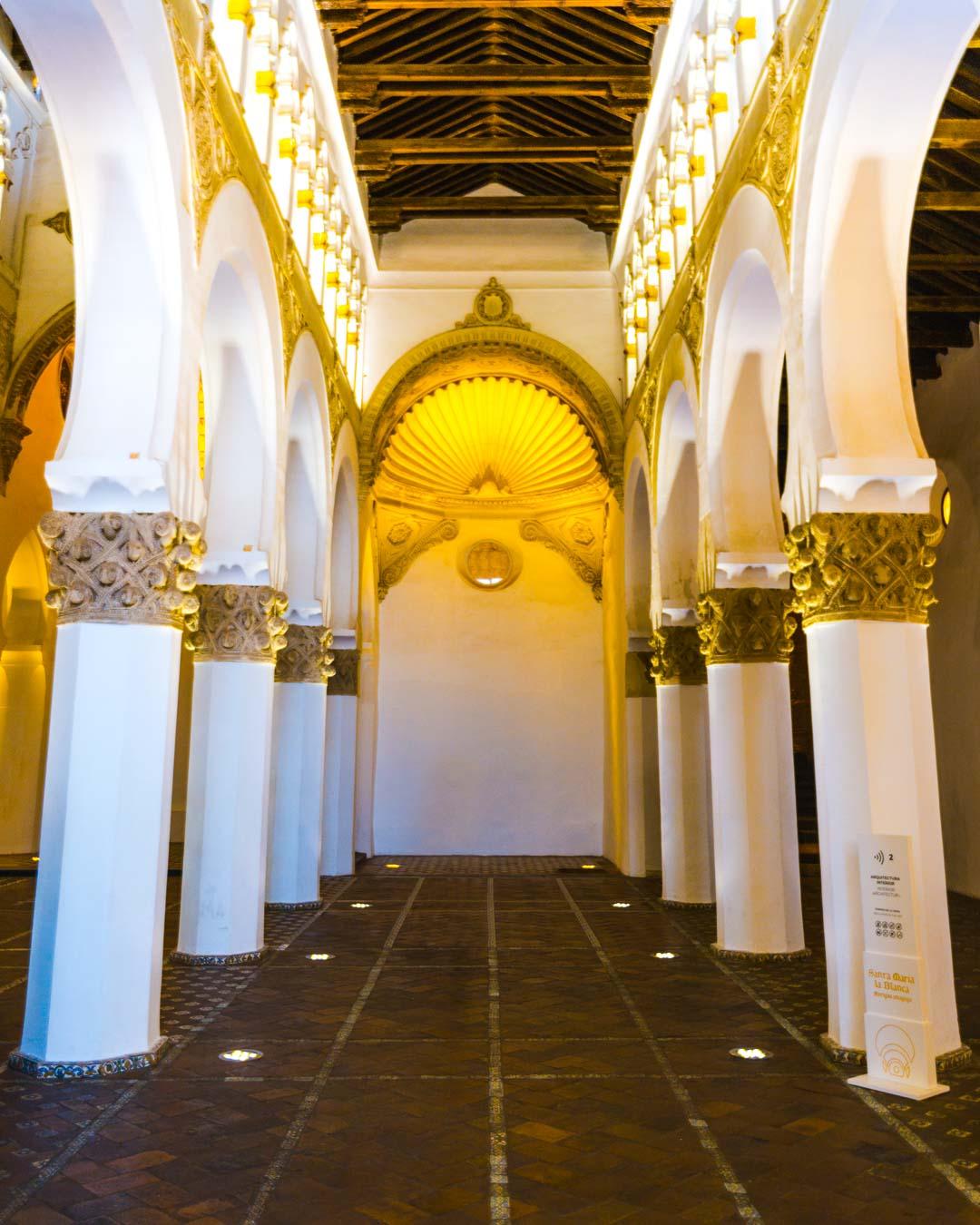
By train
If you don’t have a car, you can get to Toledo by train from Madrid. There is a direct train that goes straight from Madrid to Toledo.
From: Madrid-Puerta de Atocha
To: Toledo
Duration: 33 minutes
Cost: 13.90€ (average price)
Book here: Train to Toledo
You can also take the trains from other cities in Spain (Barcelona, Segovia, …), just click on the link above to see all options.
From the Toledo train station, you can walk to the city center, which will take you around 20 minutes.
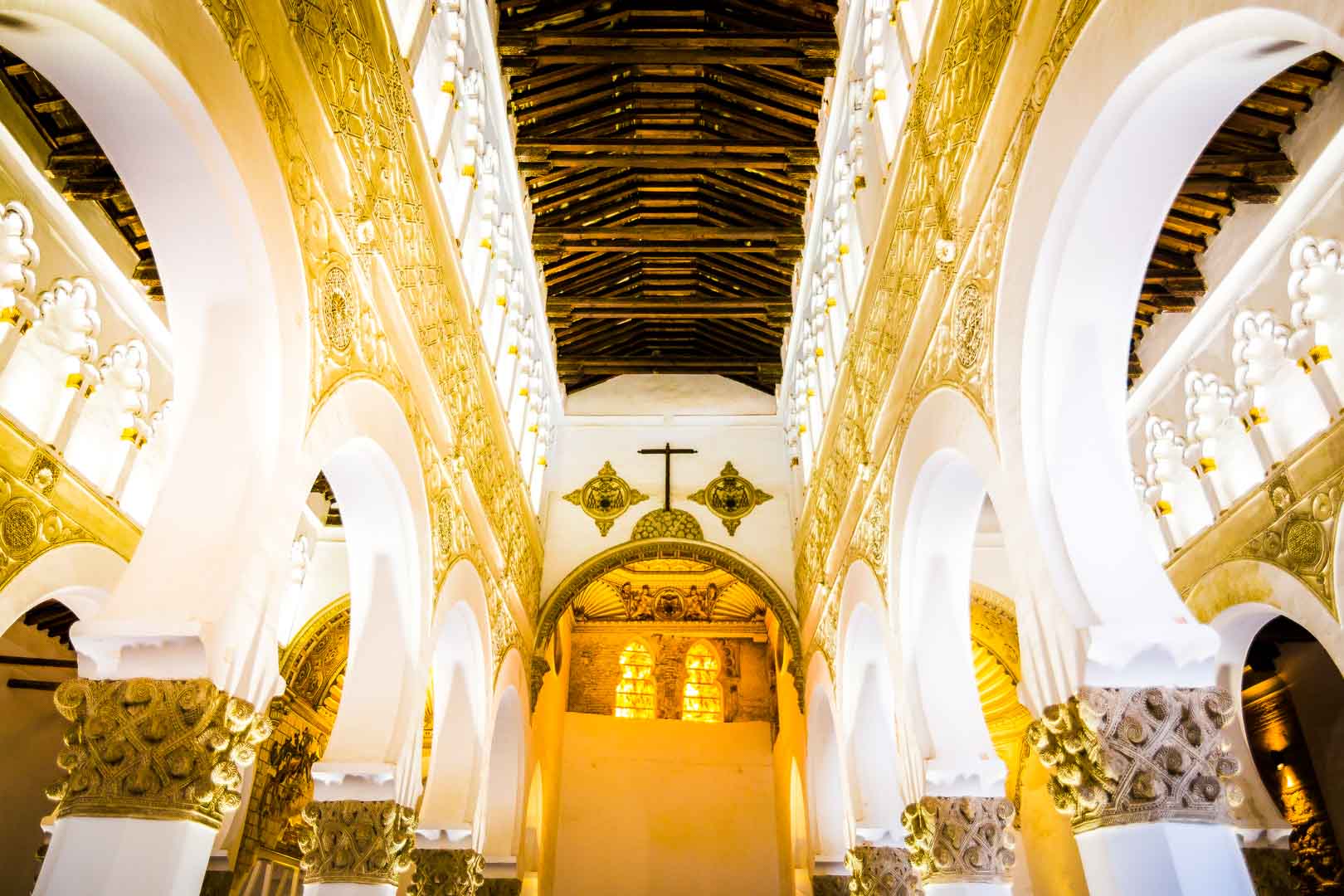
Where to Stay Near the Synagogue in Toledo
If you’re visiting Toledo, you have several options for where to stay. You’ll find below hotels depending on your travel style:
Budget: Albergue Juvenil Los Pascuales
Cheapest accommodation in Toledo, for around 14€ per night.
This youth hostel is only 2 minutes away from the Toledo Cathedral and the Toledo Castle. It also comes with included breakfast!
Comfy: Hotel San Juan de los Reyes
The Hotel San Juan de los Reyes is my favorite accommodation for a comfy stay in Avila, for around 75€ per night.
It’s ideally located in Toledo, a short walk from all the main sights. The beds are pretty comfy, and the included breakfast makes it a perfect choice for your stay in Avila. You’ll also enjoy free parking (which is nice in Toledo), and spacious bathroom with a hydro-massage bathtubs, perfect to relax after a long day of exploration in the city.
Luxury: Almunia de San Miguel
The best hotel in Toledo, hands down.
The Almunia de San Miguel has everything you’ll need, and even more: free parking, breakfast included, incredible rooms, and the location… The hotel is right next to the castle and the cathedral, you can’t be closer! There’s even a rooftop terrace with panoramic views of the city.
Visit Spain
Planning a trip to Toledo and Spain? You can find below several other articles about this wonderful part of the world to help you plan your trip:
Toledo Guides:
Visit the Iglesia de los Jesuitas – Bonus: Incredible View over the City!
The Best Viewpoint Over Toledo
Discover the nearby Puente de San Martin
Spain Guides:
How to get from Madrid to Segovia
I hope you enjoy your trip to Toledo and to Spain!
If you have any questions, let me know in the comments below, I always reply.
Travel Tools
Use any of our recommended links below to book your trip. You pay the same, and we earn a small fee; a great way to support us!
Pin this to Pinterest!
Enjoyed this guide? Then help a fellow traveler and pin it! They'll most definitely love you for it, 100% guarantee.

![[Ultimate Bucket List] The 27 Best Things to Do in Toledo, Spain](https://www.kevmrc.com/wp-content/uploads/2016/12/the-ultimate-bucket-list-of-things-to-do-in-toledo-spain.jpg)
![[True Free Tour Toledo] Explore Toledo with this Free Walking Tour](https://www.kevmrc.com/wp-content/uploads/2016/12/mirador-del-valle-toledo-spain-7.jpg)
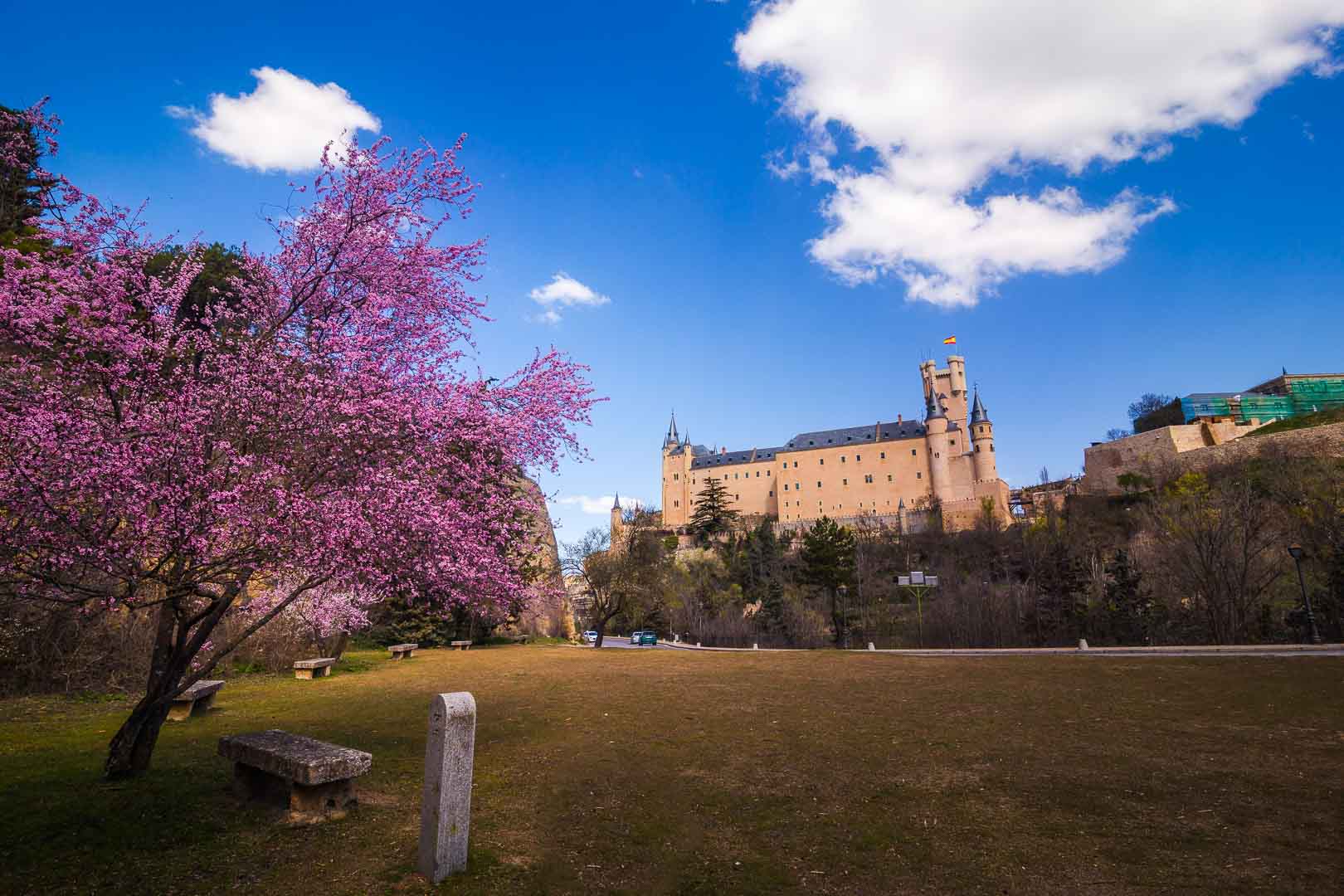
I take offense that you term Judaism a “cult”. Judaism is a religion, in fact the religion that preceded both Christianity and Islam. Jesus was born a Jew. This synagogue was taken over by the Christians after they expelled all Jews in 1492 and appropriated as a church, taking it’s original name and replacing it with the Santa Maria de Blanca. The Muslims were expelled in 1607. Jews and Muslims were not cooperated with, they were tolerated until they weren’t anymore. Let’s get all this history correct! This world needs to stop whitewashing.
Hello Jill, thanks for your comment. I understand why you would take offense, but trust me it wasn’t written in this way. For me all religions are cult; as the definition goes: “The English term originated in the early 17th century, borrowed via the French culte, from the Latin noun cultus (worship). The word ultimately derived from the Latin adjective cultus (inhabited, cultivated, worshipped), based on the verb colere (to care, to cultivate).” I’m French and for me cult is simply a religion 🙂 Sorry about that